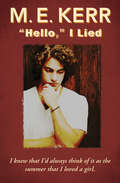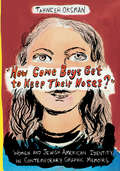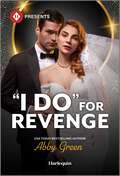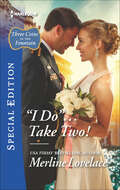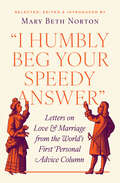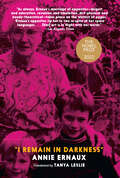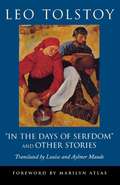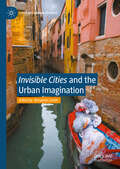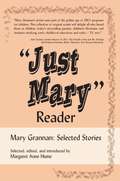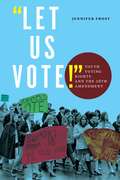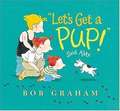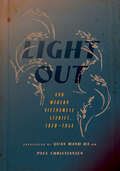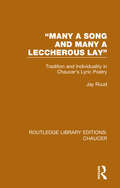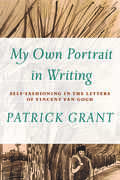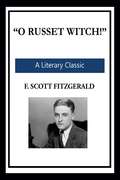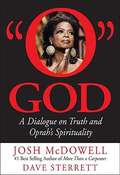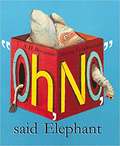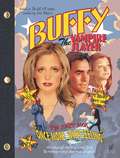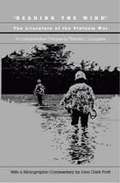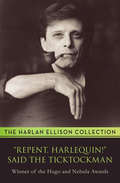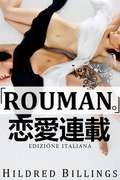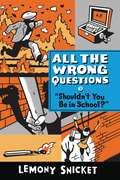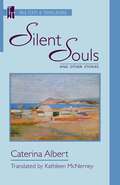- Table View
- List View
"Hello," I Lied
by M. E. KerrFrom the Margaret A. Edwards Award–winning author of Deliver Us from Evie comes a novel about a gay teenager who discovers a different kind of love during an unforgettable summer in the HamptonsI&’d always think of it as the summer that I loved a girl . . .Seventeen-year-old Lang Penner and his mother are spending the summer in the caretaker&’s cottage at Roundelay, the sprawling East Hampton estate of legendary rocker Ben Nevada. Lang passes the time walking on the beach and hoping for a glimpse of his idol. When they finally meet, Nevada is very different from the man Lang imagined. He finds himself confiding in the retired star about his homosexuality. When Nevada hears Lang&’s secret, he figures Lang is a safe bet to show the seventeen-year-old daughter of some friends from France a good time in the Hamptons. This was supposed to be the summer of Lang&’s coming out. He even has a boyfriend, Alex, a twenty-year-old actor living in Manhattan. The last thing he expects is to become infatuated with a girl.&“Hello,&” I Lied is a story about all kinds of love—from friendship to physical attraction to hero worship—as a teenager bravely confronts his sexuality. This ebook features an illustrated personal history of M. E. Kerr including rare images from the author&’s collection.
"How Come Boys Get to Keep Their Noses?": Women and Jewish American Identity in Contemporary Graphic Memoirs (Gender and Culture Series)
by Tahneer OksmanAmerican comics reflect the distinct sensibilities and experiences of the Jewish American men who played an outsized role in creating them, but what about the contributions of Jewish women? Focusing on the visionary work of seven contemporary female Jewish cartoonists, Tahneer Oksman draws a remarkable connection between innovations in modes of graphic storytelling and the unstable, contradictory, and ambiguous figurations of the Jewish self in the postmodern era.Oksman isolates the dynamic Jewishness that connects each frame in the autobiographical comics of Aline Kominsky Crumb, Vanessa Davis, Miss Lasko-Gross, Lauren Weinstein, Sarah Glidden, Miriam Libicki, and Liana Finck. Rooted in a conception of identity based as much on rebellion as identification and belonging, these artists' representations of Jewishness take shape in the spaces between how we see ourselves and how others see us. They experiment with different representations and affiliations without forgetting that identity ties the self to others. Stemming from Kominsky Crumb's iconic 1989 comic "Nose Job," in which her alter ego refuses to assimilate through cosmetic surgery, Oksman's study is an arresting exploration of invention in the face of the pressure to disappear.
"I Do" for Revenge
by Abby GreenHe ruined her life…but is he also the key to her future? USA TODAY bestselling author Abby Green enthralls with this dramatic revenge romance! Jilted by the Italian…Still craving his touch! Vittorio Vitale is feeling victorious. The Gavia family destroyed his own; abandoning their niece Flora at the altar is the perfect payback. Then Flora bursts into his office, demanding answers! Her anger is startling—as is their sudden searing attraction. Except she leaves before it can be explored… Jilted then disinherited, Flora is waitressing to survive. Until Vittorio spots her and presents a new deal—a mutually beneficial fake relationship! A Vitale proposal burned Flora before…but with chemistry this strong, can she resist saying &“I do&” again?From Harlequin Presents: Escape to exotic locations where passion knows no bounds.
"I Do" . . . Take Two!: Take Two! (Three Coins in the Fountain #1)
by Merline LovelaceHER PERFECT ROMAN HOLIDAY A Roman reunion isn't on Kate Westbrook's itinerary when she arrives in Italy. After all, she's flying solo on the vacation she'd hoped to share with her soon-to-be-ex. But when Kate tosses a coin into the Trevi Fountain, her deepest wish-a second chance with her gorgeous pilot husband-might come true... Travis knows his dangerous missions broke up his marriage, but he's determined to win back his wife. How can Kate resist the magic and moonlight of Venice, followed by a passionate interlude in a sun-drenched Tuscan villa? Now, instead of dodging missiles, Travis faces a far more daunting challenge: proving to the woman he adores that their love is as enduring as the Eternal City itself.
"I Humbly Beg Your Speedy Answer": Letters on Love and Marriage from the World’s First Personal Advice Column
by Mary Beth NortonA fascinating collection of questions and answers—about courtship, marriage, love, and sex—from a seventeenth-century periodical The Athenian Mercury—a one-page, two-sided periodical published in 1690s London—included the world&’s first personal advice column. Acclaimed historian and Pulitzer Prize–finalist Mary Beth Norton&’s &“I Humbly Beg Your Speedy Answer&” is a remarkable collection of questions and answers drawn from this groundbreaking publication.In these exchanges, anonymous readers look for help with their most intimate romantic problems—about courting, picking a spouse, getting married, securing or avoiding parental consent, engaging in premarital sex and extramarital affairs, and much more. Spouses ask how to handle contentious marriages and tense relationships with in-laws. Some correspondents seek ways to ease a conscience troubled by romantic and sexual misbehavior. The lonely wonder how to meet a potential partner—or how to spark a warmer relationship with someone they already have an eye on. And both men and women inquire about how to extract themselves from relationships turned sour. Many of these concerns will be familiar to readers of today&’s advice columns. But others are delightfully strange and surprising, reflecting forgotten social and romantic customs and using charmingly unfamiliar language in which, for example, &“kissing is a luscious diet,&” a marriage might provide &“much love and moderate conveniency,&” and an &“amorous disposition&” can lead to trouble.Delightful and entertaining, &“I Humbly Beg Your Speedy Answer&” provides a unique, intriguing, and revealing picture of what has—and hasn&’t—changed over the past three centuries when it comes to love, sex, and relationships.
"I Remain in Darkness"
by Annie ErnauxAn extraordinary evocation of a grown daughter’s attachment to her mother, and of both women’s strength and resiliency. "I Remain in Darkness" recounts Annie’s attempts first to help her mother recover from Alzheimer’s disease, and then, when that proves futile, to bear witness to the older woman’s gradual decline and her own experience as a daughter losing a beloved parent. "I Remain in Darkness" is a new high water mark for Ernaux, surging with raw emotional power and her sublime ability to use language to apprehend her own life’s particular music.
"In the Days of Serfdom" and Other Stories
by Leo Tolstoy Louise Maude Aylmer Maude Marilyn Atlas"In the Days of Serfdom" and Other Stories, originally published in 1911, presents in miniature themes developed in Tolstoy's longer works War and Peace and Anna Karenina. The compelling stories in this collection have largely been ignored by contemporary scholars and teachers because of their general unavailability. Available once again, the stories reveal new thematic and stylisitic dimensions to Tolstoy's oeuvre.While not all of the stories deal with actual serfdom, they all address the legacy of serfdom, of choicelessness, in Tolstoy's Russia. These stories are also thoroughly modern, concerned as they are with the market economy, changing values, and women's roles in society. Artistically and historically significant, they constitute ethical and spiritual questionings that deal with lives out of control, with characters making sense of the experience of living.
"Invisible Cities" and the Urban Imagination (Literary Urban Studies)
by Benjamin LinderIn 1972, Italo Calvino published Invisible Cities, a literary book that masterfully combines philosophy and poetry, rigid structure and free play, theoretical insight and glittering prose. The text is an extended meditation on urban life, and it continues to resonate not only among literary scholars, but among social scientists, architects, and urban planners as well. To commemorate the 50th anniversary of Invisible Cities, this collection of essays serves as both an appreciation and a critical engagement. Drawing from a wide array of disciplinary perspectives and geographical contexts, this volume grapples with the theoretical, pedagogical, and political legacies of Calvino’s work. Each chapter approaches Invisible Cities not only as a novel but as a work of evocative ethnography, place-writing, and urban theory. Fifty years on, what can Calvino’s dreamlike text offer to scholars and practitioners interested in actually existing urban life?
"Just Mary" Reader: Mary Grannan Selected Stories
by Margaret Anne Hume Mary GrannanFor twenty-three years during the golden age of radio in Canada, stories for children by Mary Grannan, "Just Mary," were broadcast by CBC and beloved across the country. She retired from broadcasting in 1962 and died in 1975, but her sweet-tempered and humorous stories still have the power to entertain, while recapturing the atmosphere of another time.Grannan published stories from Just Mary and Maggie Muggins in over thirty best-selling books, but she had other radio series that were never released in print. The "Just Mary" Reader presents for the first time a selection of her stories from two other radio drama series. Jubilee Road tells the adventures and misadventures of Johnny and Patty Little and their friend Salty Pickle. Or, as Johnny describes it: "We get into quite a few messes, but if you know us, you’ll know that it’s hardly ever our fault."In Land of Supposing, Grannan retold fairy tales and legends from around the world, as well as a few legends of her own making. Previously unpublished selections from Just Mary and Maggie Muggins complete the collection.
"Let Us Vote!": Youth Voting Rights and the 26th Amendment
by Jennifer FrostThe fascinating tale of how a bipartisan coalition worked successfully to lower the voting age“Let Us Vote!” tells the story of the multifaceted endeavor to achieve youth voting rights in the United States. Over a thirty-year period starting during World War II, Americans, old and young, Democrat and Republican, in politics and culture, built a movement for the 26th Amendment to the US Constitution, which lowered the voting age from twenty-one to eighteen in 1971. This was the last time that the United States significantly expanded voting rights.Jennifer Frost deftly illustrates how the political and social movements of the time brought together bipartisan groups to work tirelessly in pursuit of a lower voting age. In turn, she illuminates the process of achieving political change, with the convergence of “top-down” initiatives and “bottom-up” mobilization, coalition-building, and strategic flexibility. As she traces the progress toward achieving youth suffrage throughout the ’60s, Frost reveals how this movement built upon the social justice initiatives of the decade and was deeply indebted to the fight for African American civil and voting rights.2021 marks the fiftieth anniversary of this important constitutional amendment and comes at a time when scrutiny of both voting age and voting rights has been renewed. As the national conversation around climate crisis, gun violence, and police brutality creates a new call for a lower voting age, “Let Us Vote!” provides an essential investigation of how this massive political change occurred, and how it could be brought about again.
"Let's Get a Pup!" Said Kate
by Bob GrahamA funny, warm story for every child who's wished for a puppy. There are lots of dogs of all shapes and sizes at the animal shelter. But Karen and her mom and dad know they want Dave the moment they see him. He's small and cute and a perfect fit for the end of Kate's bed. But then they see Rosy, who is old and gray and broad as a table... How can Kate and Mom and Dad take home just ONE dog when there are so MANY wonderful animals who need a home?
"Light Out" and Modern Vietnamese Stories, 1930–1954 (NIU Southeast Asian Series)
by Paul Christiansen Quan Manh Ha"Light Out" and Modern Vietnamese Stories, 1930–1954, translated by Quan Manh Ha and Paul Christiansen, with an essay by Ngô Văn Giá, is the first anthology in English of colonial Vietnamese literature written by canonical authors. Light Out depicts colonial exploitation, impoverished peasants at the mercy of precarious crop cycles, and institutionalized corruption that pits peasants against village officials. Set over the course of a few days, the novella presents an intimate look into the rural society in northern Vietnam during the height of French colonialism, exposing the brutal realities of the period and the impact such deprivations have on the human spirit. The eighteen short stories included in this book thematically delineate colonial abuses, class discrimination, patriarchal expectations, and livelihoods tethered to an unstable environment. Aesthetically, they illuminate the impact of French literary traditions and Western thought on Vietnamese traditions of storytelling.
"Many a Song and Many a Leccherous Lay": Tradition and Individuality in Chaucer's Lyric Poetry (Routledge Library Editions: Chaucer)
by Jay RuudOriginally published in 1992. Although they were apparently much appreciated in his own time, Chaucer’s lyrics have for most of the modern era been the most neglected of his poetic productions. This work offers a comprehensive overview of Chaucer’s lyric corpus. The author extends his scope to include in-depth discussions of literary and cultural influences that have their impact on Chaucer’s lyrics. Students who come to Chaucer’s poems for the first time will here receive an excellent introduction to each poem, the important literary issues surrounding the poem as defined by previous scholarship, and Ruud’s own clear style and balanced judgment. The persuasive proofs for Chaucer’s lyric innovations and his special style of poetry will also be of interest to Chaucerian specialist academics. The book traces Chaucer’s development as a lyric poet, from more conventional early works to more individualized later ones.
"My Own Portrait in Writing": Self-Fashioning in the Letters of Vincent van Gogh
by Patrick GrantIn Grant’s earlier book, The Letters of Vincent van Gogh. A Critical Study (AU Press, 2014), he followed a practical-critical analysis of the letters that dealt with key patterns of metaphors and concepts. This volume is a complement to the first book and provides an effective, theory-based reading of the letters that brings them more fully and successfully into the domain of modern literary studies. Each chapter addresses some significant aspect of Van Gogh’s writing including a “reading” of the letter-sketches and their narrative dimensions, a deconstruction of the binaries used in Van Gogh’s writing and painting, observations of Van Gogh’s own understanding of the permeable boundary between words and visual art, and a discussion of the set of polarities apparent in Van Gogh’s discussions of imagination, fantasy, belief, and self-surrender. Consequently, as a whole and in each of its parts, this book offers a new, timely, and theoretically-informed interpretation of Van Gogh’s literary achievement.
"O Russet Witch!"
by F. Scott FitzgeraldShocking in a clever, poignant way, this story is about a pitiful young guy who falls in love from afar with a beautiful, wealthy, young and vivacious girl with russet red hair. A seemingly chance run-in with her has a profound impact on the rest of his life.
"O" God: A Dialogue On Truth And Oprah's Spirituality
by Josh Mcdowell Dave Sterrett"O" God: A Dialogue on Truth and Oprah's Spirituality provides an in-depth look at one of the greatest media influences of all time: the empire of Oprah. Between The Oprah Winfrey Show and O Magazine, millions of people are exposed to Oprah's spiritual beliefs. Christians and those of other faiths are asking tough questions and looking for answers. McDowell and Sterrett approach the spirituality of Oprah by means of a fictional narrative featuring conversation between two friends. The spiritual conversation begins when the two girls get together to discuss spiritual issues. By using stories to address the deeper issues raised in the spiritual discussions held by Oprah and her friends, McDowell and Sterrett disarm and entertain their readers while also revealing biblical truths and exposing the errant teachings and misconceptions of Oprah. Meredith Andrews explains that: "In a day and time when some people feel that truth becomes obscure and moral lines are blurry, 'O' God addresses the popular concept of tolerance, along with other controversial ideas embraced and taught by Oprah herself, in a way that is easily accessible, scripturally based, and lovingly communicated. McDowell and Sterrett do a phenomenal job of comparing and contrasting Oprah's spiritual undertakings with God's Word and helping readers to thoroughly examine the spiritual trends of the day. Completely eye-opening and a must-read." McDowell, a mega-bestselling Christian author and evangelist, teams up with Sterrett, a gifted writer and popular speaker, to broach a serious subject with a wise, balanced, easy-to-read approach. McDowell and Sterrett help readers to discern the truth about the spirituality of Oprah and her friends.
"Oh, No," Said Elephant
by A. H. BenjaminAll the animals want to play hide-and-seek, but– “oh, no!” –Elephant isn't very good at that. He's too easy to find. What about leap-frog? He's not good at that, either. What about hopscotch, or skipping, or tag? No, no and no. Poor Elephant isn't very good at many games, and the animals are starting to get frustrated with him. Luckily there is one game Elephant loves to play, and the animals oblige him, though they may have to say "oh, no!" themselves when he wants to play it again. This rollicking, silly, repetitive text will have young readers laughing out loud and asking to read it again.
"Once More, With Feeling": The Script Book (Buffy the Vampire Slayer)
by VariousGiles (to Buffy): "What did you sing about?" Buffy: "I, uh...don't remember. But it seemed perfectly normal." Xander: "But disturbing. And not the natural order of things and do you think it'll happen again? 'Cause I'm for the natural order of things." Since she's been brought back from the dead (for the second time), Buffy the Vampire Slayer hasn't quite been feeling her calling. Sure, she still gives the underworld a run for its money, but her heart just isn't in the job. Luckily, she's been able to keep her lack of enthusiasm a somewhat secret. Until now. When someone accidentally summons a music-making demon named Sweet, Buffy finds herself belting out her most private emotions. And she's not the only one -- before the battle is done, each of the Scoobies will have uncovered -- through song and dance, for better or for worse, each others' most guarded thoughts -- prompting the question, "where do we go from here?" Here, in one volume, find complete, uncut dialogue, song lyrics, sheet music, and a full-color photo insert. For the true fan, a complete, authorized guide to the smash hit musical episode!
"Papa Who Wakes Up Tired In The Dark" and "Eleven"
by Sandra CisnerosExcerpts from two stories by Sandra Cisneros
"Reading the Wind": The Literature of the Vietnam War
by Timothy J. LomperisThe decade following the American defeat in Vietnam has been filled with doubts about American politics and values, confusion over the lessons of the war, and anger about the physical and psychological suffering that occurred during the war as well as thereafter. In the years since the U. S. withdrawal, our need to make sense of Vietnam has prompted an outpouring of thinking and writing, from scholarly reappraisals of American foreign policy to highly personal accounts of participants. On the tenth anniversary of the final U. S. withdrawal, the Asia Society sponsored a conference on the Vietnam experience in American literature at which leading writers, critics, publishers, commentators, and academics wrestled with this phenomenon. Drawing on the synergy of this conference, Timothy J. Lomperis has produced an original work that focuses on the growing body of literature-including novels, personal accounts, and oral histories-which describes the experiences of American soldiers in Vietnam as well as the experience of veterans upon their return home.
"Repent, Harlequin!" Said the Ticktockman
by Harlan EllisonWinner of the Hugo and Nebula Awards: A science fiction classic about an antiestablishment rebel set on overthrowing the totalitarian society of the future. One of science fiction's most antiestablishment authors rails against the accepted order while questioning blind obedience to the state in this unique pairing of short story and essay. "'Repent, Harlequin!' Said the Ticktockman" is set in a dystopian future society in which time is regulated by a heavy bureaucratic hand known as the Ticktockman. The rebellious Everett C. Marm flouts convention, masquerading as the anarchic Harlequin, disrupting the precise schedule with bullhorns and jellybeans in a world where being late is nothing short of a crime. But when his love, Pretty Alice, betrays Everett out of a desire to return to the punctuality to which she is programmed, he is forced to face the Ticktockman and his gauntlet of consequences. The bonus essay included in this volume, "Stealing Tomorrow," is a hard-to-find Harlan Ellison masterwork, an exploration of the rebellious nature of the writer's soul. Waxing poetic on humankind's intellectual capabilities versus its emotional shortcomings, the author depicts an inner self that guides his words against the established bureaucracies, assuring us that the intent of his soul is to "come lumbering into town on a pink-and-yellow elephant, fast as Pegasus, and throw down on the established order." Winner of the Prometheus Hall of Fame Award, "'Repent, Harlequin!' Said the Ticktockman" has become one of the most reprinted short stories in the English language. Fans of George Orwell's Nineteen Eighty-Four and Aldous Huxley's Brave New World will delight in this antiestablishment vision of a Big Brother society and the rebel determined to take it down. The perfect complement, "Stealing Tomorrow" is a hidden gem that reinforces Ellison's belief in humankind's inner nobility and the necessity to buck totalitarian forces that hamper our steady evolution.
"RŌMAN." (Edizione Italiana)
by Hildred Billings Laura CarlettiLa serie REN'AI RENSAI offre uno sguardo su una relazione lesbica lungo il corso di decenni, raccontandola in ordine non cronologico tramite romanzi, romanzi brevi, novelle e racconti. "RŌMAN." Alla vigilia del loro matrimonio, Aiko scopre Reina, la sua compagna, a rimuginare sul loro rapporto, la vita, e l'invecchiare. Anche dopo vent'anni assieme, Reina ancora non sa cosa vuole dalla loro relazione - riuscirà Aiko a farle tornare in mente il "rōman", il romanticismo, che hanno coltivato e condiviso nel corso degli anni? Probabilmente ci vorrà tutta la notte. "RŌMAN." si svolge il 5 dicembre 2012 NOTA - contiene: *Linguaggio esplicito *Scene di sesso *Tanto amore per donne che amano donne Riservato a un pubblico maturo
"Shouldn't You Be in School?" (All the Wrong Questions #3)
by Lemony Snicket SethIs Lemony Snicket a detective or a smoke detector?Do you smell smoke? Young apprentice Lemony Snicket is investigating a case of arson but soon finds himself enveloped in the ever-increasing mystery that haunts the town of Stain'd-by-the-Sea. Who is setting the fires? What secrets are hidden in the Department of Education? Why are so many schoolchildren in danger? Is it all the work of the notorious villain Hangfire? How could you even ask that? What kind of education have you had?Maybe you should be in school?
"Silent Souls" and Other Stories: An MLA Translation (Texts and Translations #26)
by Caterina AlbertCaterina Albert i Paradis (1869-1966) began her career with a scandal. Her dramatic monologue "The Infanticide," delivered by a young woman, won prizes and garnered the attention of the Catalan literary world, but its harsh theme drew outrage when the anonymous author was revealed to be a woman. In the tradition of George Eliot, George Sand, and other controversial women authors, Albert had assumed a man's name, Víctor Catala. She continued to write unflinching narratives, mostly in Catalan, of the people and life around her, producing a body of work still enlisted today to help the Catalan language resist the dominance of Peninsular Spanish.????????????????????????????????????????????????????????????????
